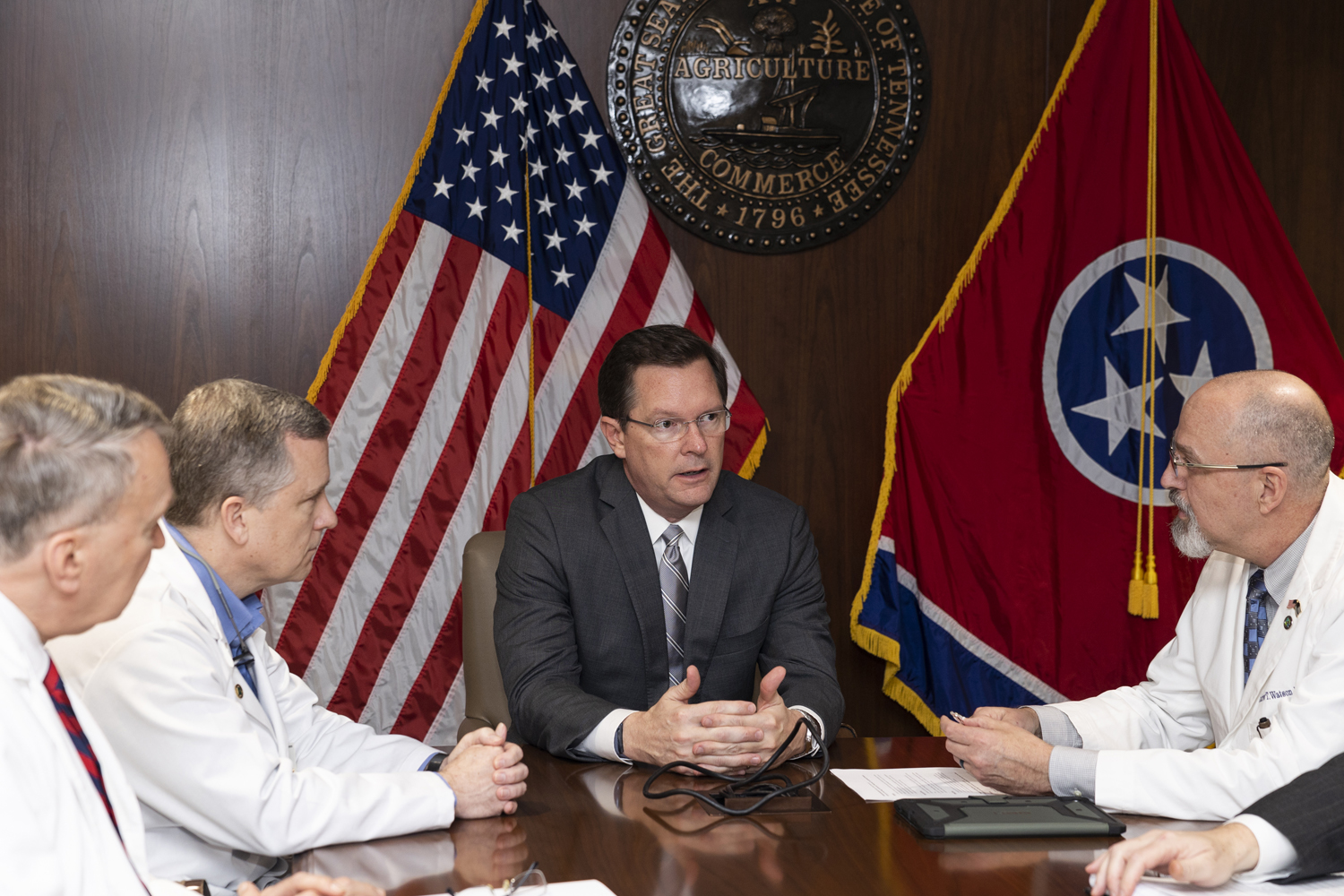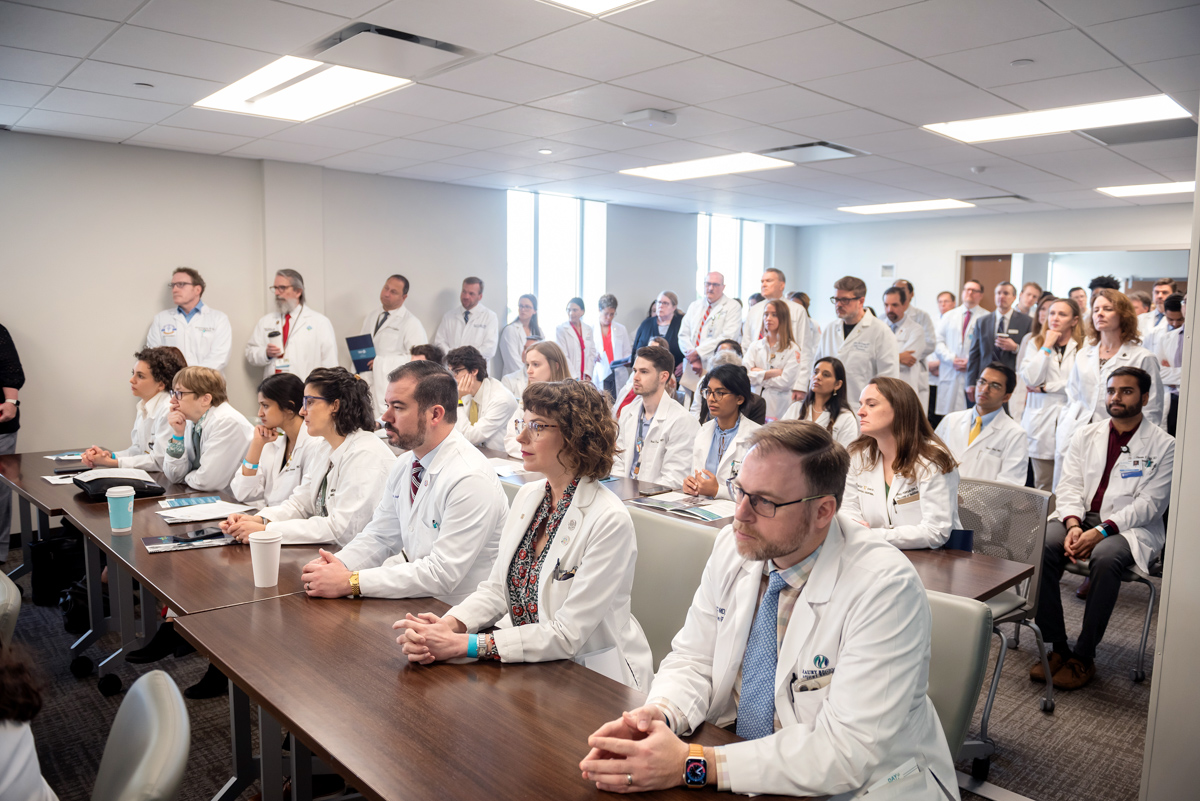In many ways, Dr. Leilah Zahedi-Spung was prepared to practice medicine in the ultra-conservative political climate of modern-day Tennessee.
Zahedi-Spung grew up, attended college, graduated from medical school and completed her residency in Georgia, a state that shares many ideological similarities with its neighbor to the north.
Like Tennessee, Georgia had a "trigger law" on the books that would ban abortion if the U.S. Supreme Court ever overturned Roe v. Wade, a landmark decision that since 1973 had granted women the constitutional right to end a pregnancy.
Zahedi-Spung's medical specialty involves caring for women and their unborn babies when there's a risk of pregnancy complications, typically because either the mother-to-be or the fetus have some illness or condition that makes childbirth more dangerous.
When she moved to Chattanooga in July 2021, she was one of the only providers in town able to perform dilation and evacuation -- the standard surgical technique to remove a pregnancy in the second trimester. It's an essential procedure for certain life-threatening pregnancy complications.
(READ MORE: Confusion over Tennessee abortion law sows fear among Chattanooga doctors)
Given other decisions by the current set of Supreme Court justices, Zahedi-Spung knew it was possible Tennessee's abortion ban -- one of the most restrictive in the nation -- would one day go into effect and hinder her ability to care for patients.
"That said, was I prepared for it to actually happen? Absolutely not," she said in a phone interview. "I never in a million years thought we would be in a place like this."
CALLED TO ACTION
The state's trigger law, called the Human Life Protection Act, made all abortions illegal starting Aug. 25. In the months since, many physicians have said the law's ambiguities endanger pregnant women and place doctors in legal jeopardy for upholding their promise to "do no harm" to patients.
Unlike many states with trigger laws, Tennessee's act deems any action to terminate a pregnancy a felony punishable up to 15 years in prison, with no exceptions.
A provision in the law allows physicians to mount an "affirmative defense" if charged criminally and argue the abortion was necessary to save the life of the mother. But unlike in most criminal cases, the law places the burden of proof on the doctor, not on prosecutors.
That means Tennessee doctors must now weigh, often with the help of an attorney, whether a patient's condition is dire enough to justify an abortion or send patients out of state for a procedure that before the new law was considered routine.
Efforts to amend the law have spurred a wave of political advocacy among Tennessee doctors unlike any in recent history, drawing physicians from both sides of the aisle and across medical specialties to try and effect change.
Russ Miller, CEO of the Tennessee Medical Association, said in a phone interview that the trigger law had "a huge rippling effect" across the medical community.
"It makes you think," Miller said. "If they did this with OB, baby delivery and maternal care, what's next?"
Medical staff leaders at Erlanger Health System called a meeting Tuesday, in part to hear from other doctors as to how the law is affecting patient care and encourage them to write their legislators. During the meeting, it was shared that numerous patients have been sent from Chattanooga to states as far as Illinois to have their pregnancies ended since the law went into effect.
(READ MORE: Chattanooga doctor sent woman on 6-hour ambulance ride for abortion)
"It's important for physicians to speak out and let people know what it means to take care of patients like this," Dr. Chris Young, an anesthesiologist, said during the meeting. "I think this is the beginning of a long fight to respect women's health and, frankly, the respect for physicians in our state."
One bill -- House Bill 883 -- is moving through the Tennessee General Assembly. It would do away with the affirmative defense provision and allow an exception to the abortion ban to "prevent the death of the pregnant woman or to prevent serious risk of substantial and irreversible impairment of a major bodily function."
Erika Thomas, advocacy engagement manager for the Tennessee Medical Association, said the group saw its highest call-to-action response rate ever achieved in favor of the bill, with more than 760 messages sent to Tennessee legislators in less than a month.
"For reference, we average about 50-60 messages sent per call-to-action," Thomas said via email.
A record number of physicians and health care advocates, more than 300, visited Nashville this month for the association's "Day on the Hill," where participants received a presentation from the bill's sponsor, Esther Helton-Haynes, R-East Ridge.
Will Brewer, legal counsel and lobbyist for Tennessee Right to Life, said during a House subcommittee meeting in February the current statute is a "good law" that's saving more than 900 babies a month. At the same time, he indicated that the anti-aboriton group would be open to some changes as long as the original intent of the law remains.
"I agree with the principle that we need to care for the mother and the baby, especially in these difficult circumstances," Brewer said. "And I believe that there is a way to clarify the Human Life Protection Act so that we do that effectively, so that these doctors that sit behind me today are more comfortable with the language."
Though an earlier version of the bill was vehemently opposed by Tennessee Right to Life, the group's president said in an email Friday that it supports the latest amended version.
The bill has cleared a House committee and is backed by House Speaker Cameron Sexton, R-Crossville. The Republican-led Senate has yet to act on the measure.
POLITICAL TENSION
While more doctors feel galvanized to advocate, others say Tennessee's political environment has grown too hostile toward medicine and public health, driving them away from a state already grappling with a physician shortage.
Zahedi-Spung said she "begrudgingly" began the process of looking for work elsewhere after a draft opinion from the Supreme Court was leaked in May 2022, revealing justices' intent to reverse abortion rights in the case Dobbs v. Jackson Women's Health Organization.
Given her specialty, Zahedi-Spung said she felt the risk of continuing to practice medicine in Tennessee was too great. She ultimately landed a job at a major health system in Colorado and left Chattanooga in December.
"People might say that I'm being inflammatory or alarmist, but I think it's an appropriate level of alarm. Tennessee does not have a stunning maternal mortality rate," Zahedi-Spung said, "and if more providers continue to leave or they can't recruit people, then the deficit in providers is only going to get worse."
(READ MORE: Tennessee among worst states for maternal health before abortion ban enacted)
By 2030, the number of OB-GYNs in the U.S. is projected to decrease from 50,850 to 47,490, while demand is projected to increase from 50,850 to 52,660, according to a report from the Department of Health and Human Services.
Tennessee is projected to have 950 OB-GYNs by 2030 with demand for 1,050, according to the report, which was published in March 2021, before the Dobbs decision.
Dr. David Soll, an OB-GYN who had practiced in Jackson, Tennessee, for 20 years, said he grew frustrated watching some politicians attack doctors over COVID-19 prevention measures and treatments. Then, a Tennessee legislator demanded that a physician-led state medical board remove a policy statement from its website warning doctors they could face disciplinary action for spreading COVID-19 misinformation.
"COVID was new, and not all doctors knew what was going on, so we have to rely on the experts who know infectious diseases better than us OB-GYNs," Soll said. "I'm not listening to some politician tell me how to treat a patient with COVID."
Around that time, he said he started eyeing new jobs that would allow him to get back into teaching.
"The abortion law is kind of the final straw," said Soll, who also recently moved to Colorado and started work at a private practice affiliated with an academic program.
Soll served as Tennessee chairman of the American College of Obstetricians and Gynecologists for two years ending in September 2022. While he doesn't think the abortion law would have affected his practice too much in Jackson, that time allowed him to hear from many other doctors across the state.
"It kind of amplified my concern as far as what other doctors were thinking as they were trying to practice medicine," he said.
Soll doesn't perform elective abortions but said he strongly believes women should be able to make decisions themselves, in consultation with their family and their doctor, when it comes to their health.
"Somebody outside of them telling them what they have to do really bothers me," he said. "Every person has a different situation, different problems that need to be addressed. They really need to have options for their health care, and it's dangerous for women not to have options available to end the pregnancy that could be deadly for their own life."
At the medical association, Thomas said lack of clarity in the state's abortion law is "by far" the biggest concern she's hearing from members and medical residents.
"I have personally met at least three physicians who have signaled their intent to leave the state if no changes are passed this session, as well as three other physicians who have already done so," she said in an email.
And while there's been a boost in membership (the association ended 2022 with 9,516 members, representing a five-year increase of 2.4% and up 23% since 2013), Thomas said most members are uninterested in politics or legislative advocacy.
"I do think the COVID-19 pandemic soured a lot of doctors' opinions about public officials and government overreach," Thomas said. "That, coupled with the new threat of criminal prosecution for providing obstetrical care, has left physicians with a sense of moral injury, believing that lawmakers don't trust their medical judgment to care for patients ethically."
Miller said it's impossible to fully untangle medicine and politics as much as most doctors would like to because the government accounts for more than 50% of all health care spending in the U.S.
"Doctors just want to help their patients, and they don't want to even have to understand or explain to a lawmaker that didn't go to medical school why they're right," he said. "We say, 'But you have to, because they pay for more than half of it, and they decide the laws."
 Contributed Photo / From left, Drs. Gene Huffstutter, a Chattanooga rheumatologist, Jim Batson, a Cookeville pediatrician, and Andrew Watson, a Memphis cardiologist, meet with House Speaker Cameron Sexton, R-Crossville, during the Tennessee Medical Association’s annual policy briefing and lobby day in Nashville on March 7, 2023.
Contributed Photo / From left, Drs. Gene Huffstutter, a Chattanooga rheumatologist, Jim Batson, a Cookeville pediatrician, and Andrew Watson, a Memphis cardiologist, meet with House Speaker Cameron Sexton, R-Crossville, during the Tennessee Medical Association’s annual policy briefing and lobby day in Nashville on March 7, 2023.LIMITED OPTIONS
Even if House Bill 883 is signed into law, many physicians say Tennessee's abortion law is still too restrictive.
The bill doesn't contain any exceptions for when a fetus has an untreatable, unsurvivable defect. It also doesn't allow abortion in the case of rape, incest or if a patient is experiencing a mental health crisis.
Dr. Joseph Kipikasa, who specializes in treating high-risk pregnancies in Chattanooga, said during the Erlanger meeting that anencephaly -- a serious birth defect in which a baby is born without part of the brain and skull -- is one condition in which abortion used to be a viable option prior to the new law. Now, those patients must go to another state where abortions are legal in the case of fatal fetal abnormalities.
"For some parents, continuing the pregnancy, getting whatever time they can get with that infant is very important to them," Kipikasa said.
But for others, he said, the risk of carrying a pregnancy to term for a child that has no chance of survival is too great.
"Pregnancy just by itself carries risk, including mortality," Kipikasa said.
And not all doctors have issues with the law as is.
Soll said he's encountered hardliners who believe in prioritizing the baby's life above all. He gave the example of a patient with breast cancer who found out she was seven weeks pregnant.
"It was recommended that she have a termination so she could get treated for her breast cancer," he said. "The argument from these pro-life people is that, 'Well, the mom is probably going to die from breast cancer, so we need to protect the baby.'"
He said he understands the need to protect unborn babies, but there are two people in the room who need to be considered, he said.
"All of us that do obstetrics like obstetrics and like babies. I mean, that's our job," Soll said. "A big part of our day-to-day practice is delivering babies, and that's what we enjoy doing. We don't enjoy terminating pregnancies just for the heck of it.
"But we have to have options available because situations come up where patients can get really sick," he said, "and we can't let a mom die just trying to protect the baby."
Contact Elizabeth Fite at efite@timesfreepress.com or 423-757-6673.


